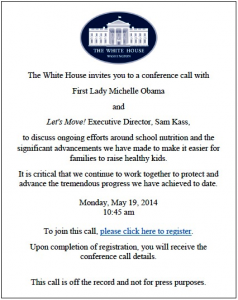Update on Congress vs. school nutrition standards
The Associated Press reported that First Lady Michelle Obama rallied supporters of the USDA’s nutrition standards for school meals in an off-the-record telephone call “with advocacy groups to discuss ongoing efforts around school nutrition and the significant advancements we have made to make it easier for families to raise healthy kids.”

Today the House Committee on Appropriations is doing its markup on the agricultural appropriations bill. This is likely to overturn nutrition standards established by scientific experts in order to:
- Reverse USDA’s nutrition standards for school meals.
- Reverse the exclusion of white potatoes from the WIC package.
As Politico puts it,
In the case of WIC and white potatoes, the provision follows on strong lobbying by the industry which is hoping to win similar language Thursday when the full Senate Appropriations Committee is slated to consider its own version of the same agriculture bill.
…For the industry, concerned that younger women have moved away from potatoes, gaining access to WIC is an important marketing tool.
Just as strongly, critics worry that the end result will be to open the door to other special interests and wreck a long-standing commitment by Congress to let independent scientists decide what foods are most needed.
As I see it, the food industry couldn’t get its way through the usual rulemaking processes, so it did an end run and got Congress to overturn the work of no less than three committees of the Institute of Medicine.
USDA Secretary Tom Vilsack explains what’s at stake:
The House bill would undermine the effort to provide kids with more nutritious food and would be a major step backwards for the health of American children, just at the time childhood obesity rates are finally starting to level off. School nutrition standards are developed by independent experts, over 90% of schools report that they are successfully implementing them, and studies show they are working to help kids be healthier. USDA has continued to show flexibility in implementing these new standards, and Congress should focus on partnering with USDA, states, schools, and parents to help our kids have access to more healthy food, not less.
In an e-mail, the Pew Charitable Trusts wrote:
We are disappointed that the House agriculture appropriations bill includes a provision that would weaken national nutrition standards for foods served in schools…it is unfortunate that the House would consider letting schools opt out of efforts to improve the health of children served through these program…Ninety percent of schools already report that they are meeting USDA’s updated nutrition standards for school lunches. Turning back now would be a costly mistake.”
The School Nutrition Association disagrees. In its version of reality, “since these standards took effect, more than one million fewer students choose school lunch each day, reducing revenue for school meal programs already struggling to manage the increased cost of preparing meals under the new standards.”
To this, Claire Benjamin of Food Policy Action, asks:
Why are Members fighting to roll back school nutrition standards? Our nation is facing a health and obesity crisis, and rather than think about the future of our children the members pushing for these rollbacks are only thinking about future campaign contributions,” said Claire Benjamin, managing director of Food Policy Action (FPA). “Schools have already made real progress implementing the reforms, and it is extremely disappointing that some members of Congress are advocating for business as usual.”
Other responses:
- The National WIC Association says “Don’t let Congress pick WIC foods.”
- United Fresh asks Congress to make no changes to the fruit and vegetable provisions.
- The National Potato Council says “we want in.”
Write your Congressional representatives and ask them to leave nutrition standards to scientists, not food companies with vested interests in selling their products to government food assistance programs.
Additions, May 20:
- American Public Health Association letter to Congress signed by numerous state and national organizations
- Washington Post story (I’m quoted)
- The Hill story: “GOP Takes on Michelle Obama“
- Alliance for a Healthier Generation statement in support of school nutrition standards
- USDA says it will allow more flexibility in the controversial whole grain requirement
- USDA’s new factsheet
Addition, May 21:
- Mark Bittman’s excellent comments
- Mission Readiness says the military needs healthy kids
Addition, May 24:
- Major General says school nutrition standards are a matter of national security



